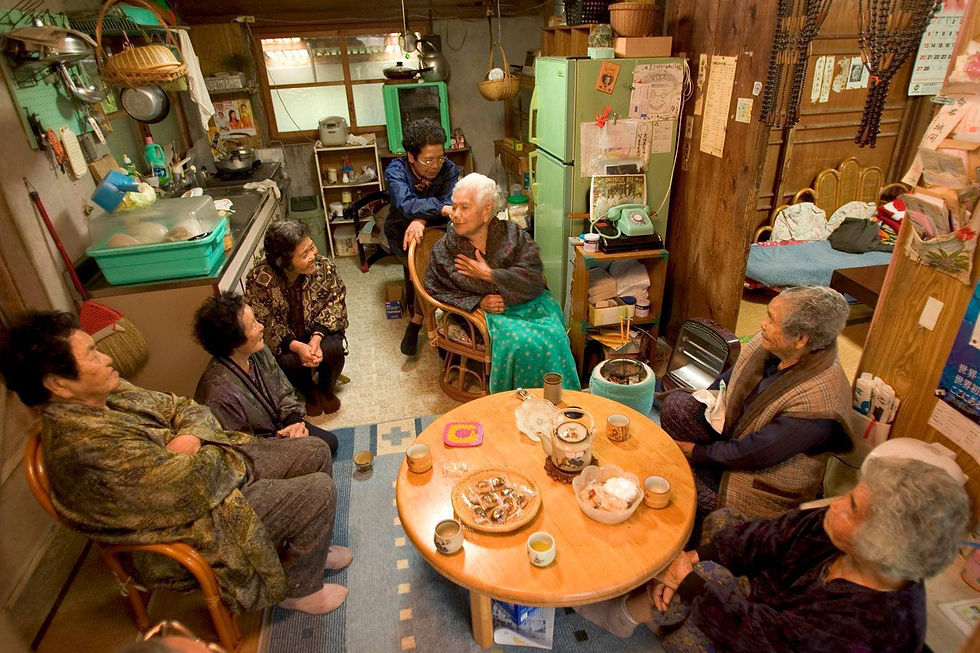The Blue Zones and what you need to know about them
- Tati
- Oct 25, 2023
- 4 min read
Updated: Jan 11, 2024
"In blue zone areas, people have somewhere to be,
someone to love, something to look forward to,
and something meaningful to do.”
- Dan Buettner
You might have heard of blue zones or even been there. Blue zones are regions in the world where people tend to live longer, healthier lives than the average person. These areas include parts of Japan (Okinawa), Italy (Sardinia), Greece (Ikaria), Costa Rica (Nicoya), and in California, US (Loma Linda).

The term “blue zone” was coined by National Geographic writer and explorer Dan Buettner, who identified five regions where people commonly live into their 90s and 100s. Scientists and researchers have found that people who live in these areas share certain lifestyle habits and environmental factors that contribute to their longevity.
What can we learn from blue zones centenarians and implement into our lives?
"The more you walk, the longer you live."
- Dan Buettner
Movement in blue zones is a natural and day to day occupation. People work their fields and gardens, go fishing in their nineties, walk their livestock or simply go for long walks with their friends.
So what physical activity is best for healthy longevity?
The type of exercise you choose isn’t that important. It’s important to regularly increase your heart rate and intensify your breathing. This is also called aerobic exercise.
Together with muscle strengthening training it helps adults stay independent and prevent many health problems that come with age.

Dan Buettner in Sardinia: 105-year-old Giovanni greets him with a glass of wine—at 10 a.m. Then Dan challenges Giovanni to arm wrestle—and loses. Giovanni spent most of his life walking Sardinia's rocky terrain as a sheep herder. The low-impact exercise helps keep his heart strong.
Every step you take more than yesterday is already an improvement and will eventually take you to your healthier and happier you.
Make your daily practice "too small to fail". Create smaller goals that you can accomplish easily and most importantly on a regular basis. Try to visualise this goal, try to emotionally connect to this image or feeling. This will help you get past the hurdles that make us want to quit on the way to anything worthwhile.
The Okinawans live by the Confucian teaching:
“hara hachi bu”
Eat until you are 80% full.
This cultural practice of mindful eating is part of the reason that Okinawa has a higher percentage of centenarians than anywhere else in the world.
The secret to eating in moderation. There is a significant difference between saying, ‘I’m full’ and an Okinawan saying, ‘I’m no longer hungry.’
Simple changes in everyday eating habits can help put the secret of hara hachi bu into practice for improved health. Most of all enjoy the food you are eating, and learn to eat only until you 80% full.
Get started with these easy tips.
Eat more slowly. Eating faster results in eating more. Slow down to allow your body to respond to cues, which tell us we are no longer hungry.
Focus on food. Turn off any devices that could distract you and eat with all your senses: take a proper look at your food. If eating bread, chocolate, fruits etc. touch your food and observe things like texture and temperature. Is it hard and crispy, or soft and mushy? Listen to the sound it makes, when you cut it or take a bite. Smell your food. How is the smell making you feel? Does it bring back pleasant memories or does it smell strange? And last but not least taste it. As the food is in your mouth, think about its taste, texture, and temperature. Try it out today!
Use small vessels. Choose to eat on smaller plates. You’re likely to eat significantly less without even thinking about it.
People in all blue zone regions have eaten healthy diets most part of their lives. Lots of whole foods: vegetables, whole grains, fruits, nuts, extra virgin olive oils, seeds and lean meat…
… and wine.
Good news from Sardinia: The Cannonau wine, a distinctive part of the Sardinian diet, contains two to three times the amount of flavonoids as in other wines. High flavonoid intake is associated with better cardiovascular health and lower risk of Alzheimer’s disease and other dementia.
So chin-chin!

A moai group of women sharing their stories, gossip and laughter. Average age of these groups: 102 years!
"If you want to go quickly, go alone.
If you want to go far, go together."
- African Proverb
Moai, one of Okinawans longevity traditions, are social support groups that start in childhood and extend into the 100s. The term originated hundreds of years ago as a means of a village’s financial support system, to pool the resources of an entire village for projects or public works. Today the idea has expanded to become more of a social support network, a cultural tradition for built-in companionship. So across Okinawa, friends “meet for a common purpose” to gossip, experience life, and to share advice and even financial assistance when needed.
A moai group of women sharing their stories, gossip and laughter. Average age of these groups: 102 years!
While Okinawans have moais, Sardinians meet with friends each evening for happy hours and 7th day Adventists in Loma Linda host weekly meals with their congregations. By finding the right tribe, you’ll not only add years to your life, but you’ll enjoy your time here just a little more.



Comments